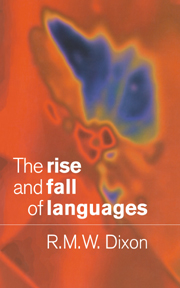Book contents
- Frontmatter
- Contents
- Acknowledgements
- 1 Introduction
- 2 Preliminaries
- 3 Linguistic areas and diffusion
- 4 The family tree model
- 5 Modes of change
- 6 The punctuated equilibrium model
- 7 More on proto-languages
- 8 Recent history
- 9 Today's priorities
- 10 Summary and prospects
- Appendix – where the comparative method discovery procedure fails
- References
- Index
10 - Summary and prospects
Published online by Cambridge University Press: 05 June 2012
- Frontmatter
- Contents
- Acknowledgements
- 1 Introduction
- 2 Preliminaries
- 3 Linguistic areas and diffusion
- 4 The family tree model
- 5 Modes of change
- 6 The punctuated equilibrium model
- 7 More on proto-languages
- 8 Recent history
- 9 Today's priorities
- 10 Summary and prospects
- Appendix – where the comparative method discovery procedure fails
- References
- Index
Summary
The punctuated equilibrium model
The hypothesis put forward here is that, during most of the 100,000 years or more that language has been in existence, there has been an equilibrium situation within each geographical area. A number of small political groups, each with its own language or dialect, lived in a stable situation, in relative harmony with each other. There was no large-scale hierarchical organisation and no one group or language or dialect was accorded prestige over more than a local area (or for more than a limited time).
Things were never static. Languages and political groupings are always in a state of shift. There is a steady ebb and flow. Some languages would fall out of use and others might split into two; but this would happen on a modest scale.
In each area, linguistic features of all kinds would diffuse. The languages in the area, and in regions within the area, would become more like each other in phonological systems, grammatical categories, perhaps also in lexemes and, at a slower rate, in grammatical forms. They would converge towards a linguistic prototype for the area.
Then the state of equilibrium was punctuated. This could be due to a natural happening, or to some material innovation (most notably, the introduction of agriculture), or to the emergence of an aggressive political leader or an aggressive religion. Or to the movement of a language group away from its original area into a new and unpopulated region.
A period of punctuation is typically accompanied by expansion and split.
- Type
- Chapter
- Information
- The Rise and Fall of Languages , pp. 139 - 148Publisher: Cambridge University PressPrint publication year: 1997



